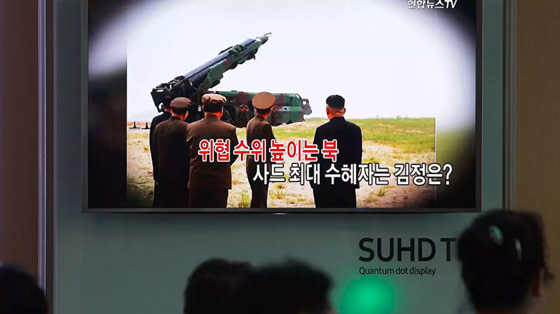Secretary of State Rex Tillerson’s visit to China was designed to convey a candid message to Chinese leaders about the Trump administration’s growing dissatisfaction with Beijing’s cautious role in dealing with North Korea’s provocative behavior. In one of his recent tweets, President Trump himself stated bluntly that China had “done little to help” resolve that problem. As a prelude to his meetings in Beijing, Tillerson emphasized that the United States was keeping all policy options on the table, including the use of military force against Kim Jong-un’s regime. Indeed, some American foreign policy observers believed that such a menacing message was aimed more at China than at North Korea. The implicit warning was that if Beijing did not do more to pressure Pyongyang and solve the growing crisis, Washington was ready to take drastic action against the North.

Such a prospect is certain to alarm Chinese leaders. But Washington’s hawkish posturing is not likely to induce Beijing to incur the risks of greatly increasing its pressure on the North Korean regime. U.S. policymakers and pundits have long overestimated China’s normal influence over its troublesome ally. During an earlier crisis, New York Times columnist Thomas Friedman asserted that the North Korean nuclear program “could be stopped tomorrow,” if Beijing wanted to take action.
Such comments create a misleading impression. True, China has substantially more leverage over Pyongyang than does any other country, since it supplies a large portion of North Korea’s food and energy supplies. But getting Kim’s regime to relinquish its nuclear and ballistic missile programs, which is what Washington demands, would require Beijing to apply excruciating pressure. That means severing, not merely reducing or delaying, essential aid to the DPRK. Even Friedman implicitly conceded that point when he outlined what China should do, stating that Chinese leaders would need to say to their North Korean counterparts: "You will shut down your nuclear weapons program and put all your reactors under international inspection, or we will turn off your lights, cut off your heat and put your whole country on a diet. Have we made ourselves clear?"
But such a course would require China to incur tremendous risks, and Chinese policymakers are understandably reluctant to do so. They have a number of plausible worries about taking such actions. One is that the North Korean state could begin to unravel. At a minimum, that would mean a massive flow of refugees into China. Indeed, given the landmines and other massive military impediments along both sides of the Demilitarized Zone separating the two Koreas, it would be easier for refugees to flee to China than to South Korea.
But that is not the only concern if North Korea began to implode. There is a great danger that such instability could lead Kim’s regime to lash out militarily, believing that it had nothing more to lose. Heightened Chinese pressure, therefore, might bring about the very war on the Korean Peninsula that the United States and Korea’s neighbors wish to prevent. Even if that nightmare scenario did not emerge, the DPRK could fragment, with rival military and political factions waging a civil war. We have already seen such developments occur in Somalia, Sudan, Yugoslavia, Libya, Syria, and Ukraine. The North Korean situation could be worse, however, since the rival forces would vie to gain control of the country’s nuclear and missile assets.
And even in the unlikely event that the DPRK dissolved peacefully and Seoul took control of a united Korea, China would still have another legitimate worry—that Washington might exploit such a result to Beijing’s disadvantage. Chinese leaders would hardly relish the prospect of the United States retaining its military alliance with a unified Korea. The suspicion would exist that, sooner or later, there would be U.S. military bases in what is now North Korea. That is not an unrealistic concern. After all, despite promises to Russia that if it consented to Germany’s reunification, NATO would not expand eastward, Washington pushed the alliance to do exactly that. Moreover, as tensions with Moscow have increased, the United States has started deploying military personnel and weaponry in those newer members that directly border Russia. Chinese officials would have no desire to see a similar development on the Korean Peninsula.
If the United States expects China to incur serious risks, it must offer appealing incentives, not make blustering demands. The first step would be to meet Beijing’s longstanding call for Washington to engage Pyongyang in serious, bilateral negotiations. But that would require the United States to consider making meaningful concessions to the DPRK. Among such concessions is a willingness to end the annual joint military exercises with South Korea, receptivity to negotiating a formal treaty replacing the armistice agreement that ended the Korean War, lifting—or at least greatly reducing—the economic sanctions that have been imposed on the DPRK, and finally, establishing formal diplomatic relations with Pyongyang.
If Kim’s regime spurned such a reasonable offer and continued to pursue its nuclear and ballistic missile programs, the United States would then be in a much stronger position to call on China to take more drastic action against its uncooperative ally. However, the Trump administration would still have to offer additional incentives to entice Beijing to incur the risks entailed in such a policy shift. At a minimum, Washington would have to agree that if North Korea collapsed under the increased Chinese pressure, the United States would aid in dealing with the resulting refugee crisis and would call on Japan, South Korea, and other U.S. allies in East Asia to do the same.
Beyond that incentive, the Trump administration would likely need to sign a written agreement that it would withdraw all of its forces and weapons (including the Terminal High Altitude Area Defense (THAAD) anti-ballistic missile system from the Korean Peninsula. China especially regards THAAD as provocative because the radars could be reconfigured to undermine Beijing’s nuclear deterrent. The United States might even have to consider offering concessions on other issues such as Taiwan and the South China Sea.
In short, inducing China to become more forceful and proactive toward North Korea would require flexible, creative U.S. diplomacy. It would also require Washington to make difficult, perhaps even painful, compromises. One thing is certain, though, simply demanding that China take action without providing any meaningful incentives for Chinese leaders to do so, is a diplomatic nonstarter.


